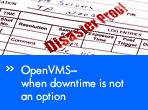HP OpenVMS Systems
Secure Web Server (based on Apache™)
OpenVMS information
HP OpenVMS systems
Evolving business value
Related Links
CSWS_PHP
HP is pleased to announce a new customer release version of CSWS_PHP. CSWS_PHP Version 5.2-17 runs with HP Secure Web Server Versions 1.3-1 and 2.1 and later for OpenVMS Alpha and Integrity servers. It does not work with Secure Web Server Version 2.0.
CSWS_PHP Version 5.2-17 is based on PHP 5.2.17. (CSWS_PHP Version 2.0 is based on PHP 5.2.6 and CSWS_PHP Version 1.3 is based on PHP 4.3.10)
» Download CSWS_PHP Version
5.2-17 for OpenVMS Alpha and Integrity servers (December 2012)
» Download CSWS_PHP Version
2.2 for OpenVMS Alpha and Integrity servers (September 2010)
Note: From 31st March 2011, HP CSWS_PHP V1.3 and all earlier versions (on Alpha and Integrity) have been obsolete without any engineering support. The replacement versions are HP CSWS_PHP V2.x or V5.2-17 on Alpha and Integrity.
» Download CSWS_PHP Version 5.2-17 Source Code (December 2012)
» Download CSWS_PHP Version 2.1 Source Code (August
2009)
See the CSWS_PHP for OpenVMS Alpha and Integrity servers Installation Guide and Release Notes for Version 5.2-17 for information about how to download, install, and run the CSWS_PHP Version 5.2-17 kit.
PHP is a server-side, cross-platform, HTML embedded scripting language that lets you create dynamic web pages. PHP-enabled web pages are treated the same as regular HTML pages. You can create and edit them the way you normally create regular HTML pages.
PHP-enabled files are simple HTML files ending in .PHP (the default extension). The .PHP files you create and include in your web directory are parsed by CSWS_PHP in the Secure Web Server. You do not need to compile the files.
For example, the following simple program called hello.php creates a static page, which means its display always remains the same. Note that PHP tags begin with.
<html><head><title>PHP Test</title></head>
<body>
<?php echo "Hello World<p>"; ?>
</body></html></code>
The "Hello, World" example does not require you to use PHP. However, to display a greeting in French or Spanish, you could allow the user to choose either "Bonjour, World" or "Hola, World."
If you replace the third line in the previous example with the following line, the user can decide how to greet the world:
<?php print $greeting, ", "; ?> World
In this example, $greeting is assigned a value that is sent to the browser.
See http://www.php.net/ for more information about PHP.


